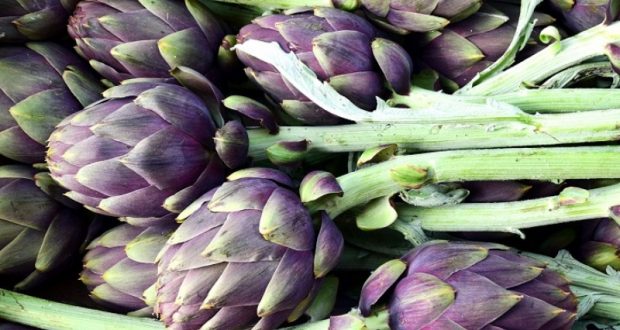By Bob Labozetta, UC Master Gardener, Mariposa
MARIPOSA COUNTY — Perennial vegetables like artichokes, asparagus, rhubarb, and horseradish need protection to survive the freezing temperatures of winter that occur in our area. Artichokes may be hardy down to USDA Zone 6 and asparagus down to Zone 4, but they do need care before cold winter temperatures set in.
For artichokes, cut this past season’s flower stalks to 6” and tie up the existing leaves with some twine. Apply a thick layer of compost around the base of the plant. Over that lay about 8” of organic mulch (chopped leaves, straw, grass clippings, wood chips, shredded bark, sawdust, pine needles, and/or even paper.) Leave the mulch in place until the spring. In April, remove the mulch and string and add a balanced organic fertilizer (10-10-10). Save the mulch for application when the summer heat sets in.
Asparagus is handled a little differently. After fall’s first frost or when the ferns begin to turn brown, cut them down to 2” stubs. This will reduce the chances of the plants acquiring diseases. Then add about two to three inches of compost evenly over the asparagus bed. Over the compost lay an even layer of about a four to six inches of organic mulch as mentioned above for artichokes.
To stagger your asparagus harvest in the spring, take the mulch off half the bed and observe the plants putting on their spring growth. When you see the plants that are still under the remaining mulch poking through, take that mulch off. Again, save the mulch for summer application.
After the first few frosts in the fall, harvest your horseradish. Gently remove the plants with a digging fork, being careful to get all the roots, otherwise the remaining roots will become invasive. Snip off the green tops about one inch from the roots. Wash the dirt off the roots, place them in plastic bags, and put them in the crisper section of your refrigerator. Wait until spring to plant again (in a different bed.)
Begin harvesting the tubers of Jerusalem artichokes (a member of the sunflower family) also after the first few fall frosts. Harvest them throughout the winter and be sure to unearth them all before spring. Otherwise, they too will become invasive.
Although rhubarb is hardy down to USDA Zone 3, it requires less care than artichokes and asparagus. Just give the plants a good layer of compost. No need to mulch over the winter.
UC Master Gardeners of Mariposa County is located at 5009 Fairgrounds Road, Mariposa. For more gardening and event information, visit them at their website or on Facebook.
UC Master Gardeners also staff a helpline serving Mariposa County, including Greeley Hill, Coulterville, and Lake Don Pedro. You may contact them at 209-966-7078 or via e-mail at mgmariposa@ucdavis.edu.
You can also listen to them on the radio at KRYZ 98.5 FM on Wednesdays at 2:00 p.m. and Saturdays at 5:00 p.m.




